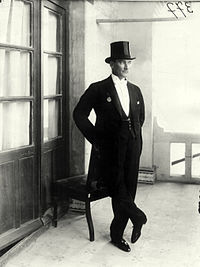A representative of the West?
Joseph E. writes:
I recall that in the past you have commented on Ataturk’s modernizing reforms. Curiously, Wikipedia’s article on that quintessentially Western form of dress, the White Tie, features a photo of … Mustapha Kemal Ataturk!

The Founder of Modern Turkey, Mustafa
Kemal Ataturk, in a top hat and white tie
LA replies:
Yes, but let us remember that Ataturk modernized and Westernized Turkey, not through democracy, but through despotism. For example, he forced his people to wear Western dress, on pain of punishment.
Second, when Turkey in more recent decades democratized itself, it began to re-Islamize itself, and thus began to destroy Ataturk’s accomplishment. (By the way, has a single neocon democracy-monger ever acknowledged that simple and undeniable fact?)
- end of initial entry -
N. writes:
It is important to remember that Ataturk sought to modernize Turkey primarily in order to make the country able to compete. The Ottoman empire was defeated during WW I by the British and Russians quite soundly. In the aftermath of WW I, great chunks of the Ottoman empire (modern day Syria, Jordan, Lebanon, Iraq, Armenia, parts of modern Greece, and so forth) were taken by the winning allies.
Seeing the Ottoman empire forcibly dismembered was motivation. It is fair therefore to view Ataturk as deliberately choosing to take on as many of the trappings of the West as possible, in order that Turks would be able to compete with the West both economically and in other ways. Thus his choices in clothing: the fez, a hat that enables a man to press his forehead to the floor in Moslem prayer, was banned, prohibited, in favor of Western hats. Robes were discouraged in favor of trousers and coat.
Thus the alphabet was changed to a Roman-based one, at a stroke cutting Turks off from the past and forcing them to read in a different way. The creation and expansion of an official government bureau of religion, which on the one hand continued (and continues to this day) to enforce the dhimmi laws on Jews and Christians, but on the other hand completely censored all the Friday sermons in every mosque in the country (a practice that ended in the 1990s).
Ataturk surely could not know what was and was not crucial to the success of Western culture. All he knew was that men in suits and morning coats directed large industrial works that turned out lots of artillery, machine-guns and rifles, and that those same men in suits presided over well-organized armies that put those weapons to work, and chopped up the Ottoman empire into fragments. He was clearly determined to preserve the Turkish heartland at any cost, and he succeeded.
To sum up, it was not sentimentality that drove Ataturk to Westernize the Turkish nation, it was a desire to preserve what was left of a once much larger empire.
Posted by Lawrence Auster at February 12, 2011 01:38 PM | Send
